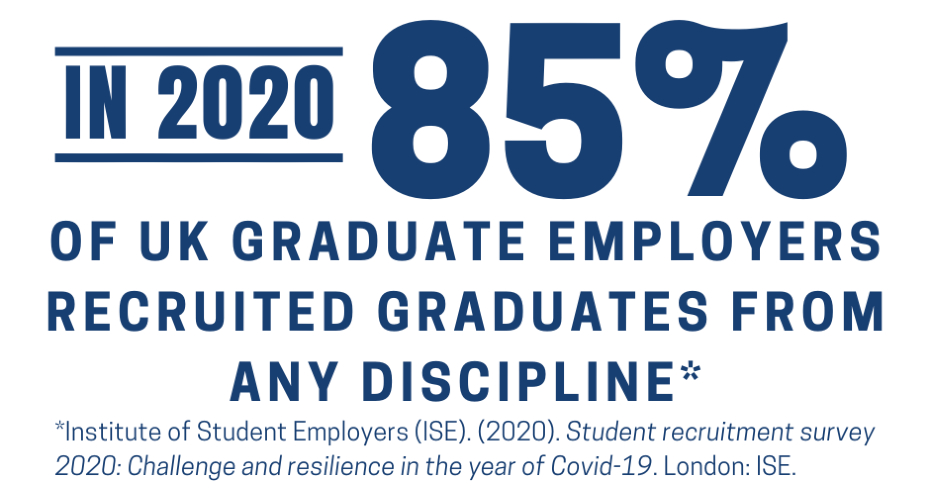
Charlotte Croft, BSc Mathematics (2020)
'Make the most of the fantastic opportunities on offer whether it be academic or social to fully take advantage of everything Exeter has.'

What can I do with a degree in Mathematics?
Here below offers a selection of the destinations University of Exeter graduates from mathematics have gone on to. The information below is not exhaustive, however it does highlight the range of job and further study options available to you after your studies.
If you wish to learn more about any of the jobs listed below you may wish to browse the job profiles on the Prospects website.
Careers with a degree in Mathematics
Recent Exeter mathematics graduates have entered a wide range of careers. Some recent examples include:* (note most popular roles highlighted in bold)
- Actuarial Analyst
- Actuarial Consultant
- Actuary
- Analyst
- Assurance Associate
- Audit Associate
- Auditor (internal | external)
- Chartered Accountant
- Consultant/Graduate Consultant
- Data Analyst
- Data Management Consultant
- Data Scientist
- Engineer/Graduate Engineer
- Software Developer
- Software Engineer
- Pricing Analyst
- Quantity Surveyor
- Tax Trainee
- Teacher of Maths
- Teacher, Secondary (other subjects)
Remember…
Many employers accept applications from graduates with any degree subject, so don't restrict your thinking to the jobs listed above. Use Prospects A-Z database of occupational profiles to find out more about the above roles.
Other resources:
University of Exeter
- University of Exeter Employment sector pages.
- University of Exeter Alumni Profiles database to explore what mathematics graduates do after their degree (select subject of study to filter).
- University of Exeter Centre of Mathematics Sciences.
- LinkedIn Exeter Mathematics (you will need to be logged in to LinkedIn to access this functionality).
- What next after a Mathematics Degree virtual alumni panels – October 2024, October 2022.
UK resources
- British Computing Society
- Institute of Mathematics and Its Applications
- London Mathematical Society
- Operational Research Society
- Royal Statistical Society
International resources
- International Mathematical Union (IMU)
- European Mathematical Society (EMS)
- American Mathematical Society (AMS)
- Society for Industrial and Applied Mathematics (SIAM)
- Association for Computing Machinery (ACM)
* Aggregated data taken from aggregating the responses from full-time, first degree, UK domiciled students who completed Graduate outcomes from 2017/18 to 2021/22 Graduate Outcomes surveys
Employers of Exeter alumni with a degree in Mathematics
Recent Exeter mathematics graduates have entered a wide range of careers. Some recent examples include the following most popular destinations:*
- Aon
- Atlas Elektronik
- Babcock International
- BDO Consulting
- Bishop Fleming Chartered Accountants
- Civil Service (Fast Stream)
- Deloitte
- EDF
- Ernst & Young (EY)
- Hazlewoods LLP
- ISIO
- KPMG
- Kubrick Group
- Lloyds Banking Group
- Met Office:
- NHS
- PKF Littlejohn LLP
- PricewaterhouseCoopers (PwC)
- University of Exeter
* Aggregated Data taken from aggregating the responses from full-time, first degree, UK domiciled students who completed Graduate outcomes from 2017/18 to 2021/22 Graduate Outcomes surveys.
For more information on the above companies click here to access the University of Exeter Library research companies and organisations for your job search resource. See Career Zone Help with researching sectors and employers resource to aid research of the aforementioned employers.
Skills
An Exeter mathematics degree will equip you with some great employability skills including:
Soft/Transferable Skills
- Abstract Thinking: handling of abstract ideas and manipulation of them effectively to develop new mathematical models and frameworks.
- Adaptability: adjustment to new situations and ready learning of new skills, embracing new mathematical concepts and applications.
- Attention to Detail: meticulous analysis of data, identification of patterns, and ensuring accuracy in mathematical work.
- Communication: clear explanation of mathematical concepts and reasoning, both verbally and in writing, to a variety of audiences.
- Critical Thinking: analysis of problems logically and systematically to identify underlying concepts and develop effective solutions.
- Lifelong Learning: a strong foundation and motivation for continuous learning, keeping up to date with advancements in the field of mathematics.
- Problem-Solving: breakdown of complex problems into manageable steps, application of relevant mathematical techniques, and evaluation of potential solutions.
- Self-Motivation: independent taking of initiative, setting of goals, and perseverance in learning and solving challenging problems.
- Teamwork: effective collaboration within teams, sharing of knowledge, and contribution to achieving common goals.
- Time Management: prioritisation of tasks, efficient management of workloads, and deadlines.
Technical/Specialist Skills
- Linear algebra: performance of operations on matrices, solving of systems of linear equations, understanding of vector spaces and linear transformations; essential for careers in data analysis, computer graphics and engineering.
- Calculus: utilisation of differential and integral calculus to analyse functions, optimise models, and calculate rates of change; instructive for applications in physics, engineering, economics and finance.
- Analysis: rigorous proof of mathematical statements, utilisation of concepts of real and complex analysis, understanding of convergence and continuity; fundamental for theoretical mathematics, research, and advanced scientific computing, key for careers in data science, actuarial science, market research and risk management.
- Probability and statistics: application of statistical methods to analyse data, model uncertainty, and draw informed conclusions from probabilistic models; vital for scientific computing, simulations and engineering design.
- Numerical analysis: use of computational techniques to solve complex mathematical problems, approximating solutions to equations and analysing numerical errors; essential for careers in finance, epidemiology, environmental science and operations research.
- Modelling: development and analysis of mathematical models to represent real-world phenomena, understanding of model limitations and selecting appropriate techniques; valuable to process business problems in industries from finance to tech.
- Programming: proficiency in programming languages such as Python or MATLAB, allowing for automation of calculations and visualisation of data, highly valuable for data science, software development, scientific computing, and quantitative finance.
- Discrete mathematics: expertise in specialist functions such as graph theory or combinatorics, analysing discrete structures and their properties; essential for roles in computer science, cybersecurity, and algorithm development.
- Advanced mathematics: in-depth high-level numeracy in specific mathematical areas such as abstract algebra, differential geometry, or complex analysis, important for careers in computer science, cryptography, network analysis and optimisation, and emergent fields of quantum computing and artificial intelligence.
- Research skills: conducting independent research, critical evaluation of existing literature, and effective communication of research findings, essential for advanced research, academia, and specialised roles in consulting.
Further Study
Around 24.6 % of mathematics graduates go on to pursue further study within 15 months of completing their undergraduate degree. Some recent progression routes include (note most popular roles highlighted in bold):
Applied Mathematics, Modelling and Scientific Computing:
- MSc Applied Mathematics
- MSc Mathematical Modelling
- MSc Mathematical Modelling (Biology and Medicine)
- MSc Weather and Climate Science
Data Science, Statistics, and Computing:
- MSc Advanced Computer Science
- MSc Advanced Computer Science with Business
- MSc Applied Data Science and Statistics
- MSc Computing
- MSc Cyber Security Analytics
- MSc Data Science
- MSc Data Science with Artificial Intelligence
- MSc Statistics
Finance, Economics, and Related Fields
- MSc Accounting and Finance
- MSc Economics
- MSc Finance and Investment
- MSc Finance and Management
- MSc Financial Analysis and Fund Management
- MSc Financial Mathematics
- MSc Financial Technology (FinTech)
- MSc Investment and Finance (CFA Pathway)
Other:
- MA Classics and Ancient History
- MPh Medical Studies
- MPh Complex Living Systems
- MPh Mathematics
- MSc Global Health Policy
- MSc Global Sustainability Solutions
Pure/Theoretical Mathematics and Related Fields:
- MA Philosophy
- MPhil Physics/Engineering (CDT)
- MSc Advanced Mathematics
- MSc by Research in Physics
- MSc Mathematical Sciences
- MSc Mathematics
- PhD Chemistry
- PhD Mathematics
- PhD Oceanography
Teaching and Education
- PGCE in Primary with SEND
- PGCE Mathematics
- PGCE Mathematics Primary
- PGCE Secondary Mathematics
Some sample University of Exeter postgraduate options:
- Applied Data Science (Ecology and Evolution) MSc
- Applied Data Science (Environment and Sustainability) MSc
- Applied Data Science and Modelling MSc
- Applied Data Science (Renewable Energy) MSc
- Applied Data Science and Statistics MSc
- Biomedical Data and Artificial Intelligence MSc
- Finance and Data Science MSc
- Mathematical Finance MSc
- Mathematics MSc
- Statistical Data Science MSc
- Statistics MSc
- Weather and Climate Science MSc
